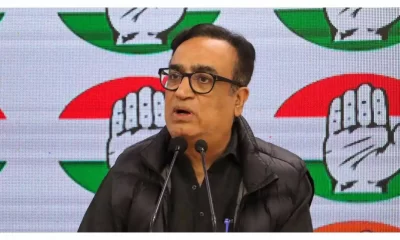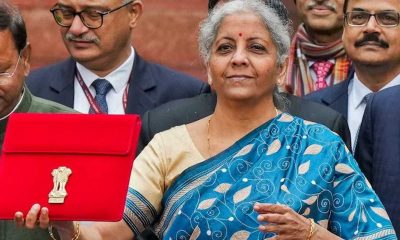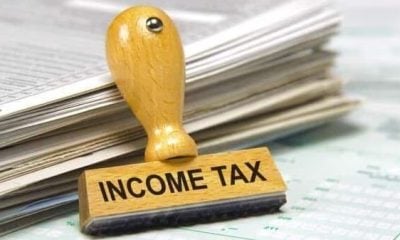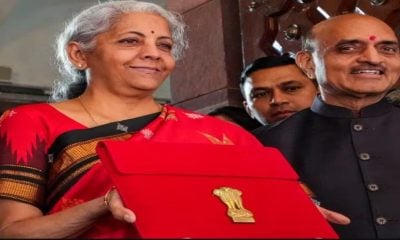[vc_row][vc_column][vc_column_text]Interim Finance Minister Piyush Goyal broke the proprietary norm and convention today (Friday, Feb 1) to make provisions for the whole year in what he had called an ‘Interim Budget’, and introducing a host of new schemes to woo various sections of the population.
(See provisions below)
The norm is that when the country is headed for a general election to elect the next government, the incumbent government presents an interim budget, which is essentially a vote-on-account to meet the government’s expenses and keep the ongoing schemes running till the next government assumes charge after the elections. Goyal has made provisions for the whole year.
Moreover, the ‘interim budget’ presented today probably has more new programmes than the regular, full-fledged budgets Modi government came up with in the previous years. The new provisions quite openly aim to woo various sections of the population: an ‘election budget’, if ever there was one. It is likely to leave for the next government the dual problem of a huge bill and depleted funds.
Former finance minister and Congress leader P Chidambaram commented: “It was not a Vote on Account. It was an Account for Votes.”
In his reaction to the budget, Leader of Congress in Lok Sabha Mallikarjun Kharge said: “You have a mandate up to May and instead they have presented a full year’s budget and are trying to befool the people of the country, keeping elections in mind.”
“These are only election sops and ‘jumlas’, as they had been speaking about ‘jumlas’ in the past,” he said about the proposals.
Be that as it may, the Budget is sure to appeal to many – and win back some of the goodwill Modi government has lost, even though it does not address the problem of joblessness and job losses.
He announced a slew of measures, mainly to benefit the middle class, address the agrarian distress, and bolster industry.
For the common citizen, the government announced full tax rebate for individuals having annual income up to Rs 5 lakh, while people with gross income up to Rs 6.5 lakh will not need to pay any tax if they make investments in provident funds and prescribed equities.
Other key measures announced by the FM were an annual benefit transfer of Rs 6,000 to each marginal farmer — with a landholding of less than 2 hectares — at a total cost of Rs 75,000 crore to the exchequer. Under the scheme, fully funded by the central government and effective from December 2018, would involve three payment transfers of Rs 2,000 each to a farmer every year.
In another important announcement, the government announced a mega pension scheme, PM Shram Yogi Mandhan, for people in the unorganised sector. Under this scheme, the government to provide a pension of Rs 3,000 a month to people in the unorganised sector after they turn 60 years old.
FM Goyal also announced that the gratuity limit for the salaried class would be increased from Rs 10 lakh to Rs 30 lakh, and he hoped that India would become a $5-trillion economy in five years’ time.
FOR INDIVIDUALS
Individuals with income up to Rs 5 lakh will not have to pay any income tax
Individuals with income up to Rs 6.5 lakh will not need to pay any tax if they make investments in PFs, prescribed equities
Standard Deduction raised to Rs 50,000/yr from Rs 40,000/yr
No TDS on house rent up to Rs 2.4 lakh per year
No TDS on bank, post office interest up to Rs 40,000, up from Rs 10,000
Gratuity limit increased from Rs 10 lakh to Rs 20 lakh
Income Tax returns to be processed within 24 hours and returns will be paid immediately
All assessment and verification of IT returns will be done electronically, without any intervention by officials
GoM to suggest ways to reduce GST for house buyers
Direct tax collections increased from Rs 6.38 trillion in 2013-14 to almost Rs 12 trillion
Tax base up from Rs 3.79 crore to 6.85 crore
FOR FARMERS
In a bid to woo the farming community ahead of the Lok Sabha elections, interim Finance Minister Piyush Goyal in his Budget speech on Friday announced a Rs 6,000 per annum direct cash transfer for farmers owning land less than two hectares.
Called Pradhan Mantri Kisan Samman Nidhi, the much-anticipated move will benefit about 12 crore small and marginal farmers and will come into effect retrospectively from December 1, 2018, and the first instalment will be disbursed before the elections.
“The amount will be transferred directly to bank accounts of farmers in three equal installments. The programme will be funded 100 per cent by the Central government. Twelve crore farmer families will benefit. The first installment will be issued soon after preparing a list,” Goyal said.
The scheme will cost the government Rs 75,000 crore per year. Goyal said Rs 20,000 crore has been earmarked for this financial year. Besides the PMKSN scheme, Rs 60,000 crore has also been set aside for rural employment scheme MGNREGA.
There are 12.56 crore marginal and small farmers having less than 2 hectares (5 acre) holdings. If Rs 6,000 is paid to each farmer, the total outlay will be Rs 75,360 crore.
There were speculations that the government may announce a flat cash transfer to all identified beneficiaries similar to Odisha’s Kalia scheme or one based on a per-acre basis like Telangana’s Rythu Bandhu scheme.
Pradhan Mantri Kisan Samman Nidhi is a modification of the Rythu Bandhu scheme of the Telangana government, which provides assistance on a per-acre basis (Rs 8,000 per acre per year) without any holding size limit.
The government also announced a financial package for farmers, the Pradhan Mantri Kisan Samman Nidhi scheme, under which each farmer will receive an amount Rs 6000 directly in their bank accounts every year. A sum of Rs 75,000 crore has been allocated for the scheme
Proposals for farmers in a nutshell
Rs 6,000 to be transferred into accounts of small farmers who have less than 2 hectares land
Farmers to be provided Rs 6,000 per year in three installments, to be fully funded by the central government
This will benefit 12 crore farmers, at an estimated cost of Rs 75,000 crore
MSP hike by 1.5 times the production cost for all 22 crops
2% interest subvention to farmers who pursue animal husbandry, fisheries jobs through Kisaan credit cards
Farmers to get 5% subvention on timely loan repayment[/vc_column_text][/vc_column][/vc_row]


 Latest world news16 hours ago
Latest world news16 hours ago
 Latest world news16 hours ago
Latest world news16 hours ago
 Latest world news16 hours ago
Latest world news16 hours ago
 India News16 hours ago
India News16 hours ago
 India News7 hours ago
India News7 hours ago
 Latest world news7 hours ago
Latest world news7 hours ago















